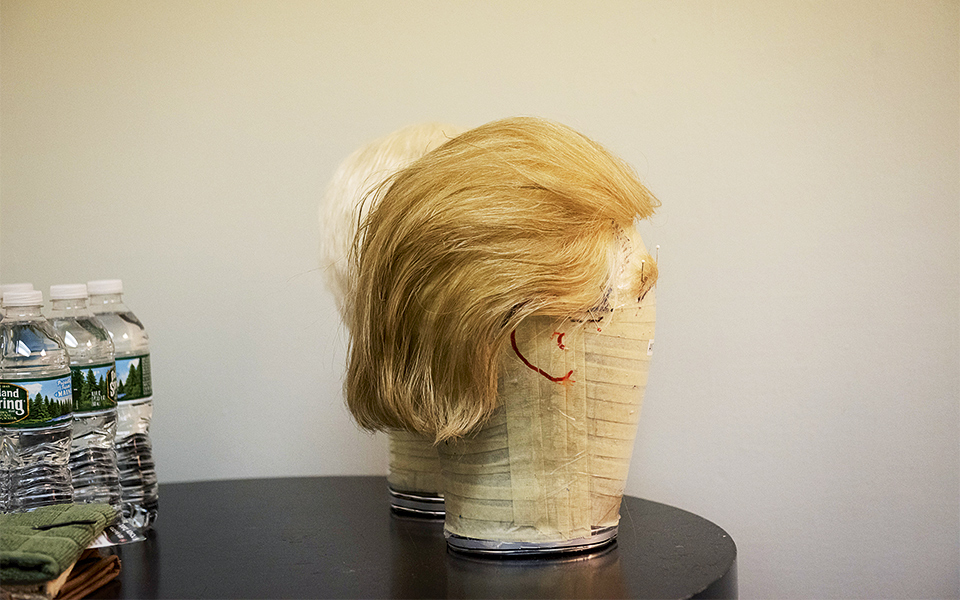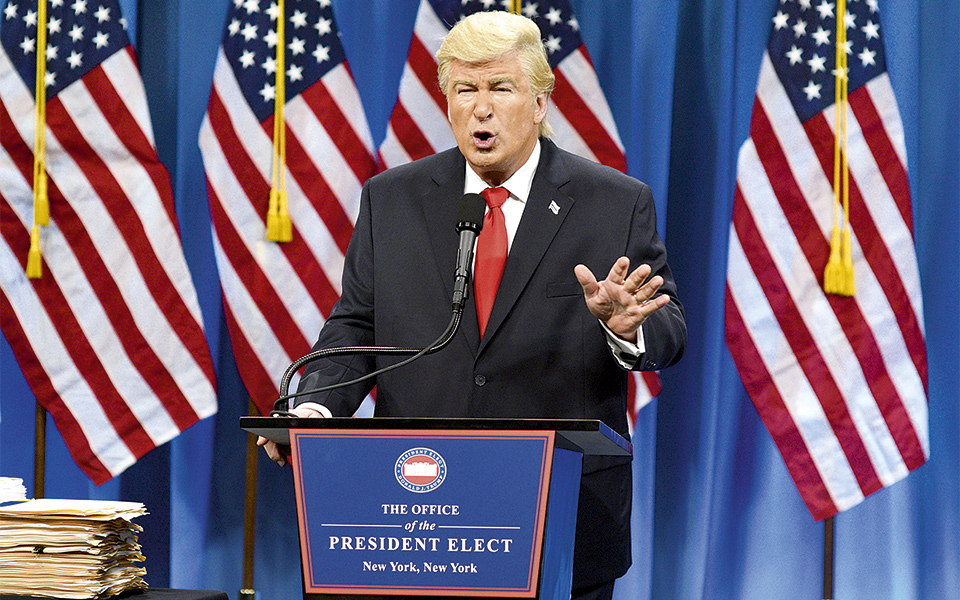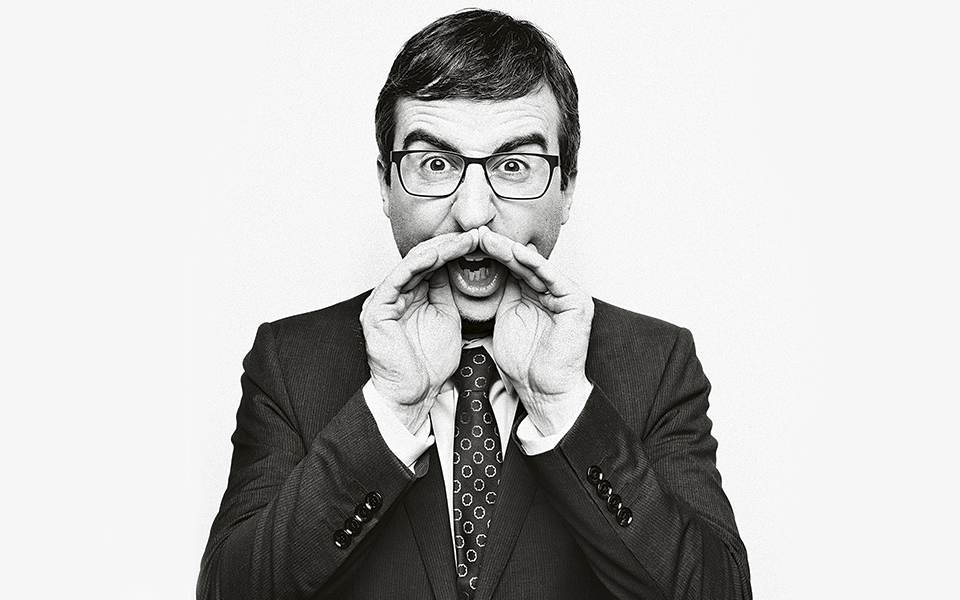Satire is the revenge of the intelligent on the privileged – it is there to prick pomposity and to check power. As the late Molly Ivins once said: “Satire is traditionally the weapon of the powerless against the powerful.” It is, in this sense, a true expression of democracy – a way for the people to have their say.
On the other hand, perhaps joking distracts us from getting up and enacting concrete political changes. “I think it does and it doesn’t,” says Mickey Noonan, editor of Standard Issue Magazine and long-time comedy critic. “Comedy is a great attention-grabber: people like to laugh, particularly when times are dire. Get us interested with some funnies and we’re more likely to listen to a message as well. And right now, I think satirical programs – This Week Tonight With John Oliver, Full Frontal With Samantha Bee, The Mash Report – are covering the current political sh*tshows on either side of the Atlantic in a more engaging and engaged way than the mainstream media.”
“So I’d say satire is vital; it’s always vital. But if you need people to engage and then follow through with some sort of call to action, it can backfire. Don’t get me wrong – sometimes it works. But sometimes it feels that laughter is the action and so there’s no follow-through.”
Today’s political landscape is chaotic, but chaos and politics go together like burgers and fries. What’s different now, though, is the way politics, the mass media and burgeoning social networks have evolved this symbiotic relationship which has produced some often bizarre results. Even the notion of reality itself seems more fluid, less set in stone.
What is the truth anymore? “I do at least think that, in an age where legitimate news sources are being cast into doubt, satire can be useful in confirming to an audience that what’s going on is really going on,” says Nick Doody – who’s written with Armando Iannucci and Rory Bremner, and for the TV shows Have I Got News For You and Mock the Week.

© Hilary Swift/The new York Times
Satire presents amusing fictions based on the failings of the real world, but today what’s real and what’s fake have themselves become hot topics. Tina Fey’s Sarah Palin and Alec Baldwin’s Donald Trump are better than the real thing, more accentuated than the originals.
“Fake news” has been President Trump’s rallying call on Twitter against almost any criticism. On Facebook during the last American election, a large number of Americans appeared to have been taken in by falsified “news” created for financial profit by small “online factories” in FYROM.
But real satire isn’t just “fake news.” It’s deliberate, purposeful and – if done well, of course – very funny. The wonderfully surreal satirical headlines of The Onion or The Daily Mash have taken on a new piquancy.
“Maybe there’s an argument that laughter helps to expose lies,” says Doody. “It’s a natural reaction to obvious untruth. But it didn’t stop Trump getting elected. That said, authoritarian regimes tend to be very sensitive about satire, so maybe there is something in laughter… something they’re afraid of? I’m not hugely hopeful at the moment, though; I feel that if comedy or satire had ever brought down a regime, I’d have heard about it.”
Helen Lewis agrees about the sensitivity of those in power. “Authoritarians hate satire because it makes them look ridiculous – and the whole aesthetic of most tyrants is dangerously close to laughable in the first place. Think of Kim Jong-un’s ludicrous parades, or of the Hitler salute. In 1941, the Nazis got all worked up about a dog that used to raise its paw in the air, which tells you a lot about their lack of a sense of humor. In 2008, the Burmese government locked up a cartoonist and comedian called Zarganar because they hated his puns so much.”
Lewis is deputy editor of the New Statesman Magazine, for which she has written satirical pieces, and she has appeared frequently on political programs on the BBC. She also recently interviewed Ian Hislop, editor of the satirical magazine Private Eye, for the Geddes Memorial Lecture at Oxford University.
During that exchange, Hislop said: “You should be able to laugh at anything… at anything grim. It’s a both a release and a way of defying it.” He has a point. Indeed we’ve been laughing and defying for millennia. Satire has trickled through time, its highpoints lasting for centuries and its entertainment and enlightenment always in sharp contrast to the darkness and the political proclivities of the periods it was created in.
Aristophanes was writing satirical works in ancient Greece before the word “satire” had even been coined. Swift’s “A Modest Proposal” and Bulgakov’s “The Master & Margarita” stretched satire into a high literary form set against a backdrop of human callousness. Today Jonathan Coe’s books (“What A Carve Up!” and “Number 11”) are the inheritors of that baroque sensibility on the page, turning rage into art.

© Will Heath/AP Photo, O Oliver
Think of satire today, though, and you think of great modern American television programs like The Daily Show. But there’s always been a huge range of satire on offer – from the relatively slapstick-based humor of Spitting Image, The Simpsons, Saturday Night Live and the cartoons of Charlie Hedbo or those in numerous daily newspapers around the world to the more cerebral efforts like those of The Onion or the works of Chris Morris and Armando Iannucci – like The Day Today, Brass Eye, The Thick of It and Veep.
The most talented satirists hit their subjects with withering accuracy – but the best satire also exists in a world of self-reflection and self-awareness. And the best satirists aren’t just attack dogs; they’ll mock themselves and the medium they work in, too, like Charlie Brooker does in Black Mirror and Newswipe.
Some satire, however, overtly tries to affect tangible political changes. Mark Thomas had a long-running UK TV show where comic stunts were used, but the show’s end goal was policy changes. And on Last Week Tonight, John Oliver starts campaigns and tries to get viewers to put their pizza down and go out and do something.
Can talk show hosts criticise power and wake us up more effectively than political parties of the opposition? Can laughter bring down a bad leader and expose a populist? “There’s a danger that satire becomes a release-valve, a substitute for justified anger,” says Helen Lewis, “which is then seen as somehow uncouth. In Britain, our political cartoons are more often cynical than savage, and that can create the feeling of an in-joke between politicians and commentators.”
In the US, this was keenly felt by many Trump voters who believed that the satirists (as well as the entire East coast “media elite”) were laughing at them, not just the man they had voted in as president.
But maybe the satirists need the politicians – and the politicians need the satirists? Comedians certainly need source material from somewhere. The 45th President of the United States hasn’t always been happy to play that role. At the 2011 White House Correspondents’ Dinner, Seth Myers was on fire with lines like: “Donald Trump often appears on Fox – which is ironic because a fox often appears on Donald Trump’s head.”
Throughout the ribbing, Trump sat stone-faced. Perhaps it was the gibes that night which helped him decide to make his presidential run. The now-president Trump famously failed to attend this year’s Correspondent’s Dinner, where he was roasted in absentia by The Daily Show’s Hasan Minhaj. Minhaj quipped about how many people had declined to host the dinner with the unforgettable line: “Don Rickles died just so you wouldn’t ask him to do this job.”

© Getty Images/Ideal Images
Was the election of Donald Trump an embarrassment of riches for satirists? “As for the notion that comedians are glad to have Trump for the material,” says American comic Megan Ford, “I think it must only be extremely privileged people that feel that way. I had enough material for political satire before – ya know, centuries of white supremacist patriarchy will give you plenty to work with. Trump has contributed to a culture in America right now where I have friends and family that are afraid every time they leave the house that they might get harassed or even killed, so the idea that comedians… [are] pleased … they have more material is actually really offensive.”
She adds: “I pretty much lost my sense of humor completely by the middle of 2016, so I’m finding it really difficult as a comedian these days. It’s also a strange time for political satire, because it’s very hard to heighten the truth right now. It’s already ridiculous and there’s nowhere to take it.”
Nick Doody agrees that the surreal is the new normal: “One issue with the current situation in the US is that the administration is in some ways so ridiculous that pointing at it and laughing seems superfluous. People already know Trump is ridiculous, and the people who don’t see it will keep on not seeing it. It’s only worth pointing out flaws when the flaws can be corrected.
I liken it to pointing out that someone has spinach stuck in their teeth: you point it out because you assume they’re not aware of it and would like to remove it. But if they’re completely covered from head to toe in spinach, you probably shouldn’t bother pointing it out; that’s obviously the look they’re going for.”
The thing is, in the past the President did seem capable of laughing at himself. The 2015 episode of The Tonight Show where Jimmy Fallon impersonated Trump and interviewed the real Trump as if he was interviewing himself in the mirror (if you follow us) was a truly daft moment. The real Trump quips: “Me interviewing me? That’s what I call a great idea!”

© Christopher Gregory/The New York Times
If the satirists need the politicians, we, the public, need the satirists even more. They don’t just entertain us, they can enlighten us, too.
“In the States, the reasonable news networks are now having to try to be neutral about a guy whose views they could dismiss as radical and dangerous 18 months ago,” says Simon Hawkins, prolific comedy reviewer and interviewer. “It’s the TV satirists – and that includes everyone from The Daily Show and Last Week Tonight to the regular chat-show opening monologists – who are giving the more appropriate responses… Comedians are the only people with a voice who are able to give this stuff the ‘WTF?’ analysis it deserves.”
You’d think it was a boom time for satire. But perhaps harsh new realities are catching up with us. Hawkins notes: “It’s not always fun for the satirists – suddenly their audiences are divided down the middle. People think this must be boom time for comedians, but it’s bloody painful for everyone. But the news is so bewildering every day that it seems odd for any comic not to come out and address it.”
Clearly, satire is something we need as a part of the democratic process. Governments come and go, but the jokes they inspire linger longer in the collective memory – and those jokes are enduringly popular.
If you don’t believe that, just take a look at the readers, viewers and audience members enjoying satirical comedy – it’s the politicos, lobbyists, journalists and backroom advisers who love and consume satire perhaps more than anyone else. They love to have their egos flattered by being talked about – even if negatively – although, of course, the heartiest laughs are reserved for jokes at an opponent’s expense.
Christopher Beanland lives in London and writes about architecture, culture and the arts for newspapers (including The Independent, The Guardian and The Telegraph) and various magazines around the world. He’s also written two novels.
This article was written for our issue of Greece Is Democracy 2017 – read and download the full magazine here.











